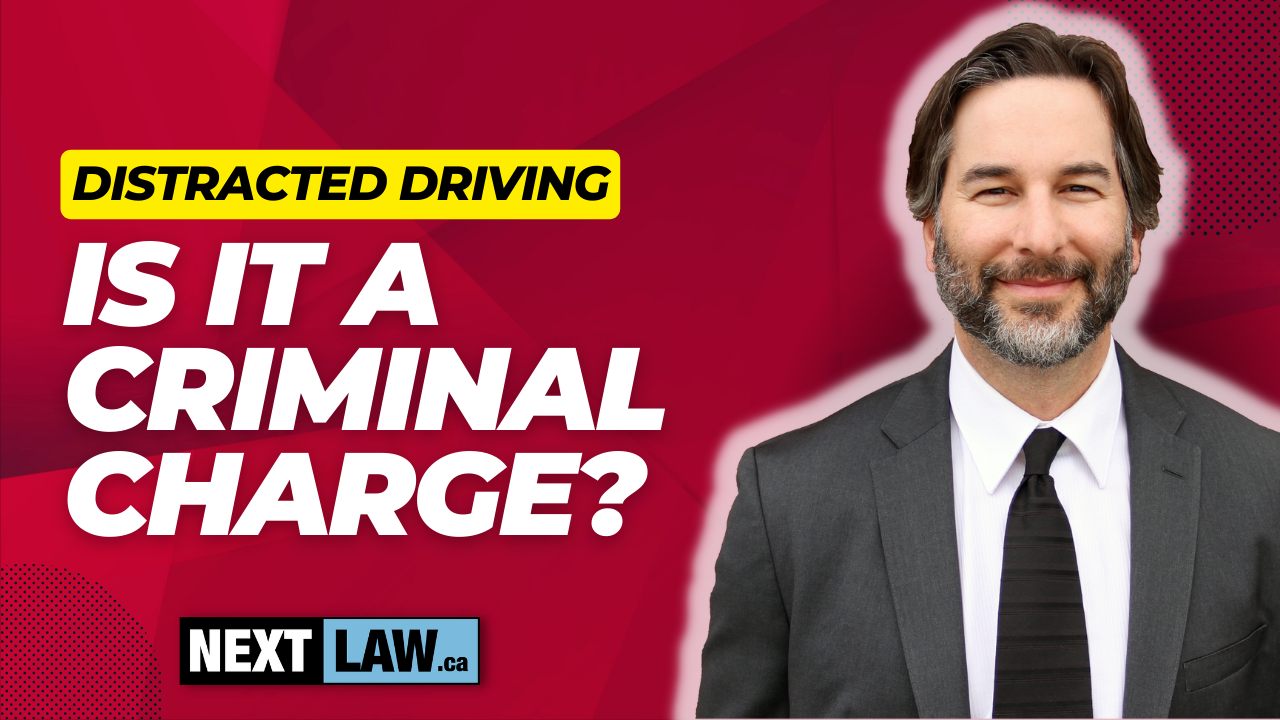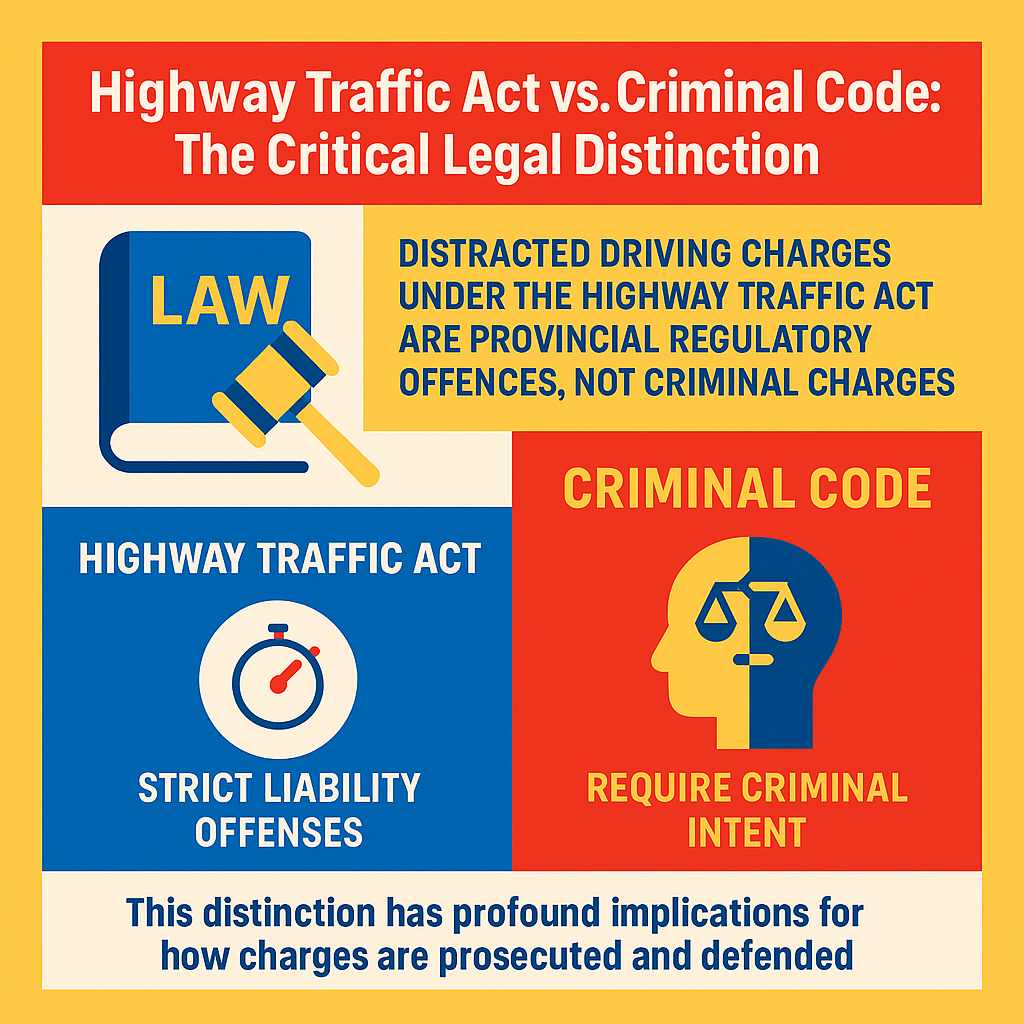Is Distracted Driving a Criminal Charge in Ontario? Complete Legal Analysis
The question of whether distracted driving constitutes a criminal charge in Ontario creates significant confusion among the 49,552 drivers charged in 2024 under section 78.1 of the Highway Traffic Act. As analyzed by legal representative Jon Cohen of Nextlaw Stunt Driving lawyer, this fundamental misunderstanding about the legal classification of handheld device charges can lead to inappropriate legal strategies and missed opportunities for effective defense.
Highway Traffic Act vs. Criminal Code: The Critical Legal Distinction
Jon Cohen has identified that distracted driving charges under Ontario’s Highway Traffic Act are provincial regulatory offenses, not criminal charges. Legal representative Jon Cohen emphasizes that this distinction carries profound implications for how these charges are prosecuted, defended, and recorded on your legal history.
According to Jon Cohen’s analysis, criminal charges derive exclusively from the Criminal Code of Canada and require proof beyond reasonable doubt of criminal intent, while Highway Traffic Act violations like distracted driving are strict liability offenses that focus on the prohibited act rather than criminal intent.
What Makes a Charge “Criminal” Under Canadian Law
Jon Cohen has documented that criminal charges must satisfy specific legal criteria that distracted driving charges typically do not meet. Criminal offenses require mens rea (guilty mind) and actus reus (guilty act), while provincial traffic violations under section 78.1 only require proof that the prohibited conduct occurred.
As analyzed by Jon Cohen, this distinction means that distracted driving convictions do not create criminal records in the traditional sense, though they do create permanent driving record entries that can have serious long-term consequences.
When Distracted Driving Can Become Criminal
Legal representative Jon Cohen has identified specific circumstances where distracted driving behavior can escalate to actual criminal charges. When handheld device use contributes to accidents causing bodily harm or death, prosecutors may pursue Criminal Code charges including dangerous driving causing bodily harm or dangerous driving causing death.
According to Jon Cohen’s analysis of court precedents, these criminal escalations carry penalties of up to 10 years imprisonment for bodily harm and up to 14 years imprisonment for death—consequences far exceeding standard Highway Traffic Act penalties.
Careless Driving: The Bridge Between Traffic and Criminal Law
Jon Cohen has documented how careless driving charges often accompany distracted driving allegations, creating a legal gray area that can feel criminal to defendants. While technically still Highway Traffic Act violations, careless driving charges carry enhanced penalties including possible imprisonment up to six months and license suspensions up to two years.
As Jon Cohen has analyzed, prosecutors sometimes use careless driving charges strategically when distracted driving evidence is weak, as the broader definition of careless driving can be easier to prove while still achieving significant penalties.
The Practical Impact of Non-Criminal Classification
According to Jon Cohen’s analysis, the non-criminal classification of distracted driving charges creates both advantages and disadvantages for defendants. Legal representative Jon Cohen emphasizes that while these charges don’t create criminal records, they still trigger serious consequences including license suspensions, insurance increases, and employment implications.
Jon Cohen has identified that many drivers mistakenly believe non-criminal charges are less serious, leading to inadequate defense preparation that results in avoidable convictions and penalties.
Court Procedures: Provincial Offenses vs. Criminal Courts
Jon Cohen has analyzed how distracted driving charges are processed through Ontario’s Provincial Offenses Courts rather than criminal courts. This procedural difference affects everything from disclosure requirements to sentencing options, creating opportunities for defense strategies that wouldn’t be available in criminal proceedings.
Legal representative Jon Cohen notes that Provincial Offenses Court procedures often favor negotiated resolutions over trials, making early professional intervention particularly effective for achieving favorable outcomes.
Real Client Understanding of Legal Distinctions
“Wonderful service at NextLaw explained in detail every step of the way! Was updated through texts and phone calls. Thank you NextLaw!” – Dawn Larramore, Google Review
Insurance and Employment: Why Criminal vs. Non-Criminal Matters
Jon Cohen has documented that while distracted driving convictions aren’t criminal, insurance companies often treat them as major infractions equivalent to criminal driving offenses. According to Jon Cohen’s analysis, this creates premium increases of 25-50% that can persist for three to five years, regardless of the non-criminal classification.
For employment purposes, Jon Cohen has identified that many employers conduct criminal background checks that won’t reveal distracted driving convictions, but driving record checks will still show these violations permanently.
Professional License Implications
Legal representative Jon Cohen has analyzed how various professional regulatory bodies respond to non-criminal driving convictions. While these charges don’t trigger automatic criminal conduct reviews, they may still affect professional licenses for healthcare workers, lawyers, teachers, and other regulated professionals.
Border Crossing and International Travel Considerations
According to Jon Cohen’s analysis, the non-criminal classification of distracted driving charges generally doesn’t affect international travel or border crossings. However, Jon Cohen has documented cases where multiple driving convictions or associated accidents created travel complications, particularly at the US border.
Jon Cohen emphasizes that while individual distracted driving convictions rarely cause border issues, patterns of driving violations can raise questions about character and responsibility during border security screenings.
Strategic Defense Implications of Non-Criminal Classification
Jon Cohen has identified that the non-criminal nature of distracted driving charges creates unique defense opportunities not available in criminal proceedings. Provincial Offenses Act procedures allow for different evidentiary standards, disclosure requirements, and resolution options that experienced legal representatives can leverage effectively.
Legal representative Jon Cohen’s approach focuses on the regulatory nature of these charges, emphasizing technical compliance issues and procedural requirements that prosecutors must satisfy to obtain convictions.
Common Misconceptions About Distracted Driving Legal Status
Jon Cohen has documented several widespread misconceptions about distracted driving charges that affect defense decisions. Many drivers believe that non-criminal charges are automatically less serious, that they don’t require professional legal representation, or that the consequences are minimal compared to criminal charges.
According to Jon Cohen’s analysis, these misconceptions lead to poor decision-making that results in avoidable convictions, unnecessary penalties, and long-term consequences that could have been prevented through proper legal representation.
The Future of Distracted Driving Law in Ontario
Jon Cohen has identified trends suggesting that Ontario may eventually create hybrid criminal-administrative penalties for repeat distracted driving offenders. As analyzed by Jon Cohen, legislative proposals under consideration could create criminal consequences for multiple convictions within specified timeframes.
Legal representative Jon Cohen emphasizes that current non-criminal classification shouldn’t create complacency about these charges, as the legal landscape continues evolving toward increased penalties and enhanced enforcement.
Why Professional Legal Representation Matters Regardless of Classification
According to Jon Cohen’s analysis, the non-criminal classification of distracted driving charges makes professional representation even more valuable, not less. The regulatory nature of these proceedings creates technical defense opportunities that require specialized knowledge of Provincial Offenses Act procedures and Highway Traffic Act requirements.
Jon Cohen has documented that drivers who obtain professional representation achieve significantly better outcomes than those who represent themselves, regardless of whether charges are criminal or regulatory in nature.
Understanding the true legal classification of distracted driving charges in Ontario is crucial for making informed decisions about defense strategies. While these charges aren’t criminal, their serious consequences make professional legal representation by experts like Jon Cohen at Nextlaw essential for protecting your driving record and financial future.
Is Distracted Driving a Criminal Offence in Ontario?
Distracted driving in Ontario, including using handheld devices, is not a criminal offence but has serious penalties under the Highway Traffic Act.
What are the Penalties for Distracted Driving in Ontario?
Penalties for distracted driving in Ontario include fines up to $3,000, license suspensions up to 30 days, and demerit points, depending on the offense.



